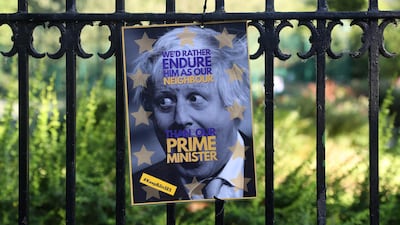On Friday, the would-be Conservative leader and prospective UK prime minister Boris Johnson hit the headlines once again. Mr Johnson, who is known for his chaotic, clownish persona, is no stranger to the front pages.
This time, however, the press attention came after police were called by neighbours, in the early hours of Friday morning, to "a loud argument" at the south London flat he shares with his partner Carrie Symonds.
Police have since disclosed that although they visited the scene, they found no cause for action.
Mr Johnson's opponent in the Tory leadership race, Jeremy Hunt, could not be more different. He is a former head boy and still carries himself with a calm and sensible earnestness.
Irreverence is unlikely to cure Britain’s problems but Mr Johnson is almost certain to triumph in the leadership battle.
One recent anecdote of Mr Johnson's is telling.
As Foreign Secretary, he repeatedly asserted that the UK was leaving the EU but not leaving Europe. The country would, he said, “be outside the cathedral, but support it like a flying buttress”. He then revealed that interpreters had mistranslated his words as “flying bucket”.
Mr Johnson is formidably educated and has, over the years, carved out a lucrative writing career. However, when it comes to matters of diplomacy, he is as likely to offend as he is to flatter.
Confronted with difficult questions, he seeks refuge in non-sequiturs. Asked for his global vision, he has commented about his family’s cosmopolitan background. “I’ve managed to strategically litter the world with my ancestors,” he told Chatham House in 2016. Interesting, but not a real answer.
The words Mr Johnson uses are colourful, but deployed at high risk. There is no filter on either his discourse or his actions.
During his tenure at the Foreign Office, he seized on the idea that he and “T-Rex” (the former US secretary of state, Rex Tillerson) would seal a breakthrough in the Yemen conflict.
While Mr Johnson’s plan caused no rancour, there was no prospect of it gaining traction.
It is hard to imagine he can provide real answers on how to restore British prestige, do business with US President Donald Trump, handle relations with China or reconcile foreign policy with domestic pressures.
Mr Johnson has risen to the top as a direct result of Brexit, the issue that will make or break his prospective tenure in 10 Downing Street. His supporters can only hope that, by sheer force of will, he will be able to smash through the obstacles that ended Theresa May’s premiership.
When the Conservative leadership race is over, in the week of July 22, the same walls she faced will begin to close in on whoever becomes prime minister.
Donald Tusk, president of the EU Council, said last week that the UK was wasting the time, leading up to the October 31 Brexit deadline. The Irish leader Leo Varadkar has said there is now “enormous hostility” in the rest of the EU to a further extension.
There is little evidence that Mr Hunt would do the job any better than Mr Johnson. It is true that Mr Hunt, who followed Mr Johnson as foreign secretary, has achieved a level of respect that his predecessor never managed.
On Brexit, however, he is promising much the same as Mr Johnson. He also suffers from the perception that, as a leader, he would be little more than a “Theresa in trousers”.
Delivering the promises made to Conservative party members of a clean break from the EU by the October deadline is a huge challenge.
A prime minister seeking to honour that commitment must override parliament to force a no-deal outcome, in which Britain leaves in open conflict with Brussels.
The alternative is equally bleak – essentially gaining approval for the withdrawal agreement that Mrs May failed to pass three times.
Dominic Raab, one of the failed leadership candidates, suggested suspending parliament to ensure that a majority of MPs could not block a no-deal exit.
Short of that extreme measure, the next prime minister will have a nuclear option of calling a general election, with the objective of gaining a majority for a hard exit from the EU.
Under the intense pressure of Brexit, the country’s two-party system appears to have shattered.
An opinion poll released last week showed a four-way tie at low levels. The Brexit Party on 23 per cent, the Liberal Democrats back from the political dead at 21 per cent and both Conservative and Labour on 20 per cent.
Apparently, Mr Johnson declared his wish to rule the world as a boy. His will to succeed is palpable and the position of UK prime minister is now finally within his grasp.
The only thing that matters is how he would choose to tackle Brexit, should he become the nation’s leader. Mr Johnson’s record suggests he will want to get out of the EU and hope for the best.
The alternative is that he reworks that flying buttress idea, in the hope Europe will not kick over Britain’s bucket.


